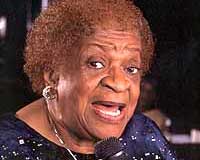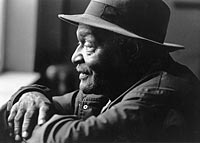|
Detroit
blues historically has been largely a music of African-American
migrants from the south — from Big Maceo
to John Lee Hooker to Bobo Jenkins. Even more recent
figures such as the Butler
Twins
and Willie
D. Warren,
a pioneer in use of electric bass guitar with Otis Rush
in the 1950s, moved from the South and ended up in Detroit
in the 1970s.
Most locally born musicians have been jazzmen or fell
into the R&B bag. Still, growing local blues artists
is not a futile labor. Juanita McCray, Robert
Jones
and Thornetta
Davis
stand out as Detroit natives who have taken on the blues
mantle. And a growing number of young white musicians
and racially mixed acts — some of them refugees
from the rock arena — such as Jim
McCarty,
Mr.
B,
the Detroit
Blues Band
and Mudpuppy
have maintained a fresh and powerful blues presence.
 |
Alberta
Adams bustin' some phat rhymes on the mic!
photo
by Artemia Nyos |
Still,
Curtis Butler of the Butler Twins is adamant about the
need to acknowledge the African-American roots of the
blues, which he thinks tend to get glossed over these
days. He remembers a gig he was playing when a young
white kid proceeded to lecture him in alcohol-drenched
words about how the late Stevie Ray Vaughan had invented
the blues. “I said, 'Listen, boy, the blues is
the only thing a black man can call his own. Stevie
Ray Vaughan never picked cotton. The blues come out
of slavery. Don't you never say that.'”
The Butler Twins were preceded on the local scene by
another pair of brothers. The Collins brothers —
Louis, known as “Mr. Bo,” and McKindley, known
as “Little Mac” — maintain that connection
to the roots of the music. Mr. Bo, whose guitar sound
bore a strong resemblance to that of B.B. King (so much
so that some say it may have hindered his career), was
a fixture on the Detroit blues scene for most of the
years after he moved to Detroit from Mississippi in
1950 at the age of 18. He recorded with such Detroit
labels as Blues Boys, Big D, and Gold Top. He won the
Detroit Blues Society Lifetime Achievement Award in
1996, and died not long thereafter. Little Mac, who
played both guitar and bass and made a memorable appearance
at the 1973 Ann Arbor Blues and Jazz Festival, was also
a regular performer around the Detroit area until his
death, not long after his brother’s, in 1997.
John Sinclair, a ’60s political activist, poet
and music impresario, first made his presence felt as
manager of the MC5
rock band, then moved on to promoting blues and jazz.
Sinclair’s introduction to the blues came when
he was a kid listening to well-known WJLB-AM radio host
“Frantic” Ernie Durham, who played the hits
of such big-time blues names as Howlin’ Wolf and
Muddy Waters. For Sinclair, a white kid listening to
the blues and absorbing the music as much as he did,
Durham’s show was a transforming experience.
| “People
don't know what I went through, man, to keep the
blues alive. I promised Bobo Jenkins on his dying
bed that I'd do it.” |
In
an effort to expose others to the music that had affected
him so deeply, Sinclair co-founded the original Ann
Arbor Blues and Jazz Festival with Peter Andrews in
1972. “We met a guy who inherited a bit of money
and wanted to know what to do with it,” says Sinclair.
Although the original incarnation of the festival only
lasted for two years — 1972 and 1973 — it
is widely regarded as one of the largest and most influential
such festivals anywhere in the country.
“There
were people who the bluest they would get would be the
Yardbirds and the Allman Brothers,” says Sinclair.
“That was the fun part of it, turning on young
people to folks they never heard of.”
More
than any other festival, the Ann Arbor Blues and Jazz
Festival featured a wide variety of talent from both
music worlds, and Sinclair took great pleasure in putting
together totally unpredictable lineups that still managed
to work. For example, Saturday night’s lineup in
1972 featured Little Sonny, Doctor John, Bobby “Blue”
Bland and Pharoah Sanders. That same three-day festival
featured Sun Ra, the Art Ensemble of Chicago, Otis Rush,
Hound Dog Taylor, Muddy Waters, Howlin’ Wolf, Bonnie
Raitt and Sippie Wallace.
The following year the show was headlined by Ray Charles,
Charles Mingus, Big Walter Horton and Jimmy Reed, but
the hit of that year’s festival was a blues musician
by the name of One String Sam. He wailed on that one
string, particularly with a tune “I Need $100,”
that was included on a record of the festival’s
acts.
“I
rediscovered him living in a housing project in Inkster,”
said Sinclair.
By 1974, Ann Arbor wasn’t enthusiastic about continuing
to support the festival, so it was moved for one last
show to Windsor. “We basically were bankrupted
by that time and had to shut it down,” said Sinclair.
And just as quickly as it had started, the best music
festival of its kind screeched to a sudden halt. The
shame of it wasn’t just the vacuum left by the
absence of such a great festival, but that without festivals,
there really wasn’t much opportunity for Detroit
blues artists to play other than in a handful of blind
pigs, cabarets and clubs.
But not everyone was willing to just sit around and
watch the blues disappear. Especially not Famous
Coachman.
 |
Uncle
Jesse White, recalling the musical history of Detroit.
photo by Artemia Nyos |
The
Coachman cometh
“People
don’t know what I went through, man, to keep the
blues alive,” says Coachman, sitting behind the
counter of his record store, Coachman’s Records,
which he has owned in one form or another since 1954.
“I promised Bobo Jenkins on his dying bed that
I’d keep the blues alive. He passed away in 1984,
and I’m proud today of what I’m doing with
the blues.”
To step inside Coachman’s record store is to step
into a potent combination of blues history and modern-day
reality. The neighborhood surrounding the store is in
ragged disrepair, and occasionally someone may come
through the door to ask Coachman’s help with one
thing or another. More often than not, the request may
be for a few dollars. Knowing virtually everyone who
visits his store on a first-name basis, Coachman usually
knows what the problem is before the request gets made
— and he helps out if he can.
The store itself is cramped with memorabilia: old album
covers, CDs, new releases, family photos, photos taken
of Coachman with various blues celebrities, and just
plain stuff. After spending close to 50 years running
the shop, it’s not surprising that he has managed
to store such an incredible collection of material.
On one wall is a poster of hip-hop artist Lil’
Kim. Elsewhere are posters of Millie Jackson, Isiah
Thomas and The New Life Community Choir.
Even if you never saw the man, anyone who ever heard
Coachman on the radio would be able to pick him out
of a crowded room the moment he began to talk, with
that trademark voice full of down-home grit and gravel.
It’s a voice tailor-made for the blues. And starting
in 1976, for 21 years on WDET-FM 101.9, Coachman hosted
the country’s longest continuously running blues
radio show.
He would routinely shout out to some of his buddies
over the air, share his thoughts on a particular topic
or interject some spontaneous lyrics of his own during
the middle of a song. Then, once his blues show wound
down to a close during the wee hours of Sunday morning,
Famous Coachman transformed into Brother Coachman, shifting
the focus of the music from blues to inspirational.
However on public radio it couldn’t be called inspirational
or gospel, so Brother Coachman decided to name the program,
“Positive Music With A Message.”
“I
told ’em my religion wouldn’t allow me to
play blues on Sunday morning,” he said.
Coachman’s show was readily identifiable with his
deep, rough-hewn voice. He could be counted on to play
“Three O’ Clock Blues” every Sunday,
right at 3 a.m. The show was as much Coachman’s
personality as it was the music.
Years ago, when Black Bottom and Paradise Valley were
still a vibrant reality, Coachman’s store was called
Sugar Hill Records. The building was originally used
as an appliance repair shop, but Coachman altered it
a bit when he disconnected the speakers from a large,
old-fashioned radio that he had found, hooked those
speakers up over the door of the shop, and began broadcasting
the blues.
Coachman began doing a show out of the tiny shop for
WGPR-FM 107.5, later moving the show to the studios
of WDET-FM.
Coachman recalls that it took a lot of work to put the
blues message on the air every week.
“I
was producing the show, carrying my own records and
everything. “Now they (WDET-FM) have one of the
best blues libraries in the Midwest,” says Coachman.
Over the years it’s hard to estimate how many local
blues musicians were steered home from their weekly
late night gigs just by the sound of the gravel in Coachman’s
voice. Thinking back on it, Coachman has to laugh. “I
used to bring a lot of you home drunk.” •
|
